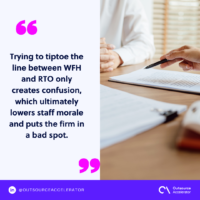Attendance problem
It’s been five years since the worldwide implementation of remote and hybrid arrangements, yet businesses are still enforcing terrible policies that further complicate matters.
Big Four accounting firm PwC has implemented an awkward, and somewhat condescending, system that allows senior partners to track attendance pass swipes, a function typically reserved for the HR department.
The firm claims the measure aims to verify whether employees are adhering to company policy, which requires them to spend three days a week, or 60% of their shift, with clients or in the office. Staff who violate the policy could face sanctions that could affect their performance evaluations and annual bonuses.
What exacerbates the situation is that employees are marked “amber” on the dashboard if their office attendance falls below 60% and “red” if it drops below 40%, and this information is visible to almost everyone.
Work ethic
The measure makes it appear that the number of hours spent on an office chair is the be-all and end-all of productivity. What happened to the actual output? Performance indicators? Simple project management software?
PwC says the measure “aims to address persistent and deliberate non-compliance.” From the looks of it, there’s a deeper systemic problem within PwC, and it is using a lousy band-aid solution to address it.
You want people who can accomplish things with minimal to no guidance — those who can look out for themselves and do not need to be babysat. Showing up on time and abiding by rules are habits developed at home and in school during one’s younger years.
When one joins the workforce, following attendance protocols shouldn’t even be a major concern. It’s the bare minimum expected from professionals.
Take the lead
Some studies have outlined the benefits of office work, while others have revealed the advantages of remote work. Some employees work better offsite, while others thrive onsite. Given such contrasting studies and behaviors, it all boils down to what the firm wants.
The “traffic-light” measure implies that PwC truly believes that return-to-office mandates boost productivity, so why not just enforce such a policy? Are they afraid of backlash? Trying to tiptoe the line between WFH and RTO only creates confusion, which ultimately lowers staff morale and puts the firm in a bad spot.
During difficult times, businesses must confront the problem, devise a decisive policy, and stick to it. These policies will either be castigated or supported. Firms must learn how to navigate through these differences in opinions and defend their choice. Employees would rather be part of a no-nonsense company than one that easily yields.
The question for your business
How does your company enforce and manage attendance?



 Independent
Independent





















